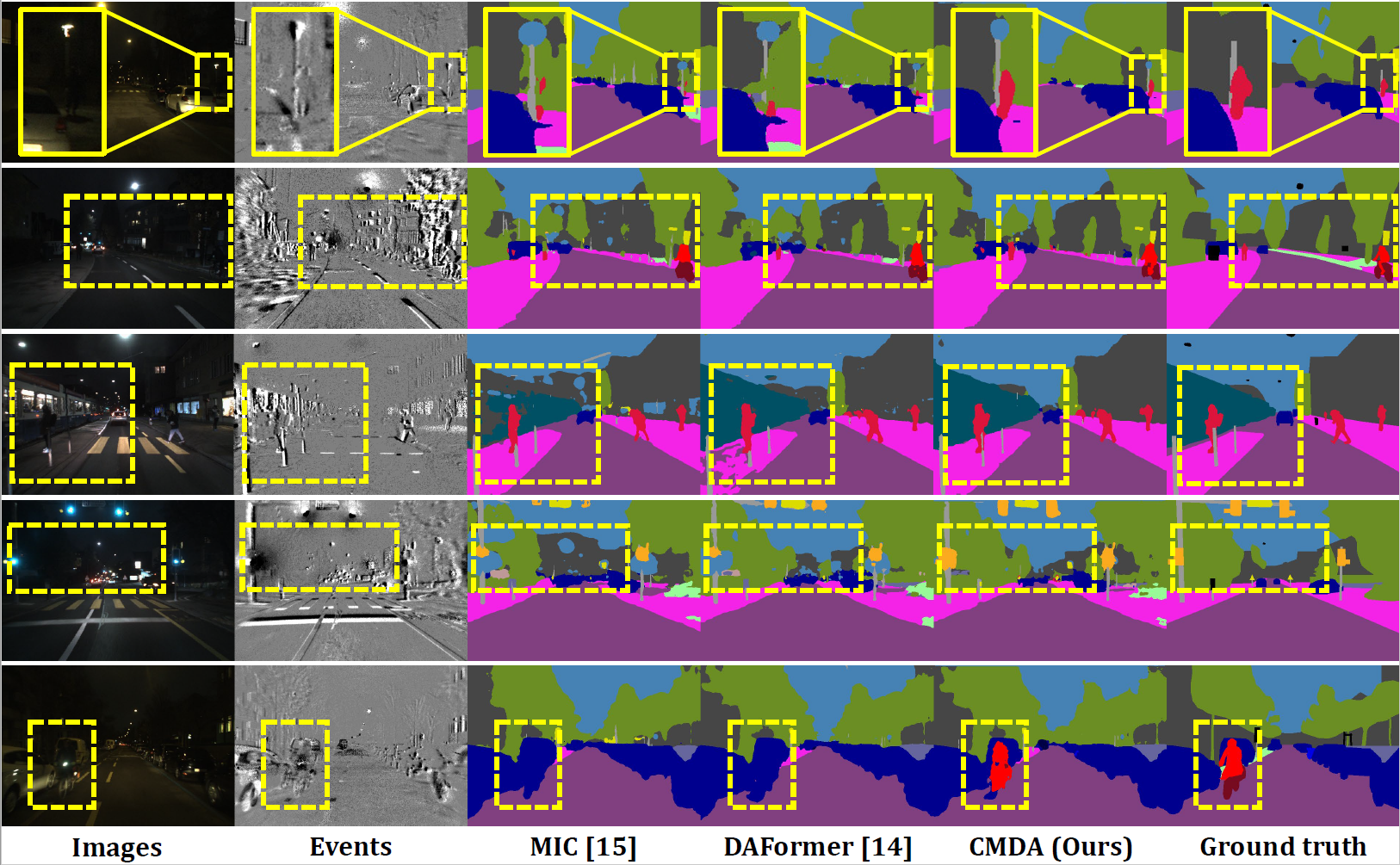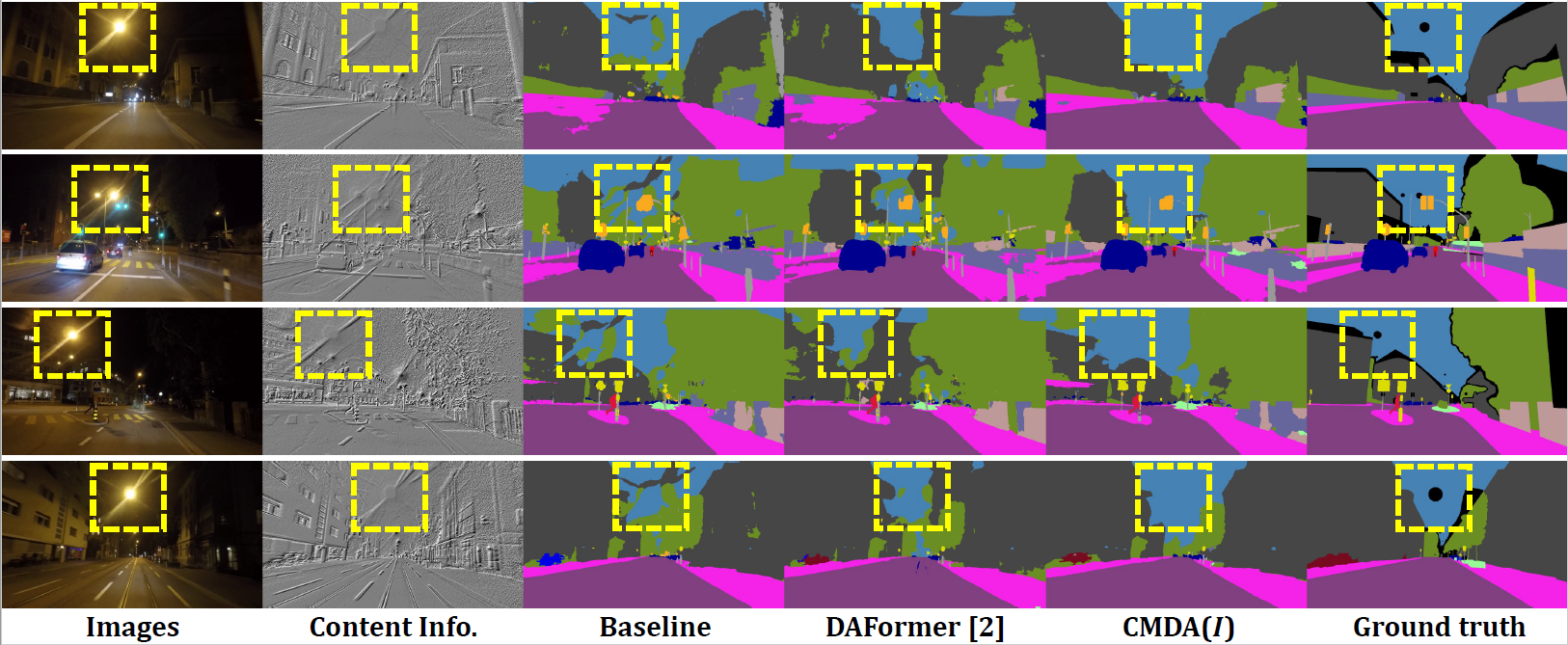by Ruihao Xia, Chaoqiang Zhao, Meng Zheng, Ziyan Wu, Qiyu Sun, and Yang Tang
🔔 We are happy to announce that CMDA was accepted at ICCV2023. 🔔
Most nighttime semantic segmentation studies are based on domain adaptation approaches and image input. However, limited by the low dynamic range of conventional cameras, images fail to capture structural details and boundary information in low-light conditions.
Event cameras, as a new form of vision sensors, are complementary to conventional cameras with their high dynamic range. To this end, we propose a novel unsupervised Cross-Modality Domain Adaptation (CMDA) framework to leverage multi-modality (Images and Events) information for nighttime semantic segmentation, with only labels on daytime images.
In CMDA, we design the Image Motion-Extractor to extract motion information and the Image Content-Extractor to extract content information from images, in order to bridge the gap between different modalities (Images to Events) and domains (Day to Night). Besides, we introduce the first image-event nighttime semantic segmentation dataset. Extensive experiments on both the public image dataset and the proposed image-event dataset demonstrate the effectiveness of our proposed approach.
The strengths of CMDA, compared to the previous
state-of-the-art UDA method DAFormer, can be observed
in qualitative examples from our proposed DSEC Night-Semantic dataset.

Even without the event modality, our proposed Image
Content-Extractor effectively mitigates the impact of
nighttime glare, resulting in clearer edge segmentation
of the sky and other objects.

If you find this project useful in your research, please consider citing:
@Article{xia2023cmda,
title={{CMDA}: Cross-modality domain adaptation for nighttime semantic segmentation},
author={Xia, Ruihao and Zhao, Chaoqiang and Zheng, Meng and Wu, Ziyan and Sun, Qiyu and Tang, Yang},
journal={arXiv preprint arXiv:2307.15942},
year={2023}
}
For this project, we used python 3.8.5. We recommend setting up a new virtual environment:
conda create -n CMDA python=3.7
conda activate CMDAIn that environment, the requirements can be installed with:
pip install -r requirements.txt -f https://download.pytorch.org/whl/torch_stable.html
pip install mmcv-full==1.3.7 # requires the other packages to be installed firstFurther, please download the pretrained backbone mit_b5.pth
here,
style transfer network cityscapes_ICD_to_dsec_EN.pth
here
and put them in a folder pretrained/ within this project.
Cityscapes:
① Please, download leftImg8bit_trainvaltest.zip and
gt_trainvaltest.zip from here
and extract them to data/cityscapes.
② Please, download leftImg8bit_IC1 from here
and extract them to data/cityscapes.
③ Finally, please run the following scripts to convert the label IDs to the train IDs and to generate the class index for RCS.
python tools/convert_datasets/cityscapes.py data/cityscapes --nproc 8DSEC Night_Semantic:
Our proposed DSEC Night_Semantic consists of 5 nighttime sequences of Zurich City 09a-e, and includes 1,692 training samples and 150 testing samples. For each testing sample, we manually annotate them in 18 classes: Road, Sidewalk, Building, Wall, Fence, Pole, Traffic Light, Traffic Sign, Vegetation, Terrain, Sky, Person, Rider, Car, Bus, Train, Motorcycle and Bicycle.
① Please, download the events_left.zip and images_rectified_left.zip in zurich_city_09_a~09_e from
here and extract it
to data/DSEC_Night/zurich_city_09_x/events(images).
② Please, download the labels and warp_images folders from
here
and extract it to data/DSEC_Night/zurich_city_09_x.
③ Finally, run the following scripts to generate night_dataset_wrap.txt and night_test_dataset_wrap.txt for DSEC DataLoader.
python create_dsec_dataset_txt.py --root_dir /path_to_CMDA/CMDA/data/DSEC_Night/④ (Optional) We modify the interpolation function in the warping process to get more realistic paired images. You can download the V2 version here. Note that the results in our paper are obtained on the V1 version of our dataset.
DarkZurich (Optional):
Please, download the Dark_Zurich_train_anon.zip and Dark_Zurich_val_anon.zip from
here and extract it
to data/dark_zurich.
python tools/convert_datasets/cityscapes.py data/cityscapes --nproc 8The data folder structure should look like this:
CMDA
├── ...
├── data
│ ├── cityscapes
│ │ ├── gtFine
│ │ │ ├── ...
│ │ ├── leftImg8bit
│ │ │ ├── ...
│ │ ├── leftImg8bit_IC1
│ │ │ ├── ...
│ │ ├── sample_class_stats_dict.json
│ │ ├── sample_class_stats.json
│ │ ├── samples_with_class.json
│ ├── DSEC_Night
│ │ ├── zurich_city_09_a
│ │ │ ├── events
│ │ │ │ ├── left
│ │ │ │ │ ├── events.h5
│ │ │ │ │ ├── rectify_map.h5
│ │ │ ├── images
│ │ │ │ ├── left
│ │ │ │ │ ├── rectified
│ │ │ │ │ │ ├── xxxxxx.png
│ │ │ │ │ │ ├── ...
│ │ │ │ │ ├── exposure_timestamps_left.txt
│ │ │ │ ├── images_to_events_index.txt
│ │ │ │ ├── timestamps.txt
│ │ │ ├── labels
│ │ │ │ ├── zurich_city_09_x_xxxxxx_grey_gtFine_labelTrainIds.png
│ │ │ │ ├── ...
│ │ │ ├── warp_images
│ │ │ │ ├── xxxxxx.png
│ │ │ │ ├── ...
│ │ ├── zurich_city_09_b~e
│ │ │ ├── ...
│ ├── dark_zurich
│ │ ├── gt
│ │ │ ├── ...
│ │ ├── rgb_anon
│ │ │ ├── ...
├── ...
Cityscapes→DSEC_Night:
python my_run_experiments.py --root_path /path_to_CMDA/CMDA/ --base_config configs/fusion/cs2dsec_image+events_together_b5.py --name cmda_cs2dsecCityscapes→DarkZurich (Optional):
python my_run_experiments.py --root_path /path_to_CMDA/CMDA/ --base_config configs/fusion/cs2dz_image+raw-isr_b5.py --name cmda_cs2dzCityscapes→DSEC_Night:
Testing & predictions are already done after training and do not require additional steps.
Cityscapes→DarkZurich (Optional):
The CMDA checkpoint trained on Cityscapes→DarkZurich can be tested on the DarkZurich testset using:
python my_test.py --work_dir work_dirs/local-basic/230221_1646_cs2dz_image+raw-isr_SharedD_L07_C01_b5_896f6The predictions can be submitted to the public evaluation server of the respective dataset to obtain the test score.
The checkpoints come with the training logs. Please note that:
- The logs provide the mIoU for 19 classes. For Cityscapes→DSEC, it is necessary to convert the mIoU to the 18 valid classes, i.e., the final mIoU 56.89 should be converted to 56.89*19/18=60.05.
This project is based on the following open-source projects. We thank their authors for making the source code publically available.